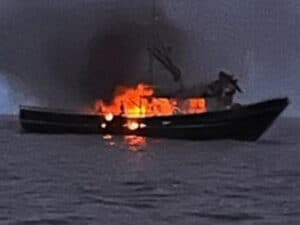
Court says California smoke abatement laws are inapplicable to ships
Written by West Coast law firm Keesal, Young & Logan (KYL) notes that In an opinion issued June 10, 2011, a Los Angeles Superior Court ruled that California’s laws regulating smoke emissions from ships’ diesel engines are inapplicable as they are preempted by the Federal Clean Air Act. KYL says “the ruling could have a significant impact on the selective enforcement of visible emissions limits against oceangoing vessels calling in California and perhaps other U.S. States.”
West Coast law firm Keesal, Young & Logan (KYL) notes that In an opinion issued June 10, 2011, a Los Angeles Superior Court ruled that California’s laws regulating smoke emissions from ships’ diesel engines are inapplicable as they are preempted by the Federal Clean Air Act. KYL says “the ruling could have a significant impact on the selective enforcement of visible emissions limits against oceangoing vessels calling in California and perhaps other U.S. States.”
“The City Attorney for Los Angeles filed a criminal complaint against the owners and managers of an oceangoing vessel docked in the Port of Los Angeles alleging violations of California Health and Safety Code Section 41701 and South Coast Air Quality Management District (SCAQMD) Rule 401. Both laws set limits on the amount of smoke that may be emitted from a source. The limits are set on the basis of an arcane Ringlemann standard that relies for its accuracy on the visual acuity and smoke school training of a ‘smoke reader.’ The City claimed the vessel emitted excessive smoke from its auxiliary engines after the ship lost power due to a main engine failure that also caused damage to its auxiliary engines which, in turn, it was alleged emitted ‘excessive smoke.’ This was challenged by the owners. The fact that the ship was in extremis did not stop the inspector from citing the ship for a violation.
“Historically, violations of these smoke emission rules resulted in nominal administrative fines or civil penalties that were modest (typically $5,000 or less for a first offense; but, these figures have increased noticeably in recent years). This is the first known criminal prosecution for such alleged violations. A criminal conviction in this case could have resulted in maximum penalties and mandatory assessments for as much as $400,000 and, according to the City Attorney, three years of probation under a court supervised compliance plan. The same City Attorney initiated a similar criminal case against another oceangoing vessel shortly after filing this matter.
“Keesal, Young & Logan, attorneys for the defendants, made a motion to dismiss the charges based on Federal preemption principles. KYL argued that while the California provisions are enforceable against stationary sources (e.g. land based incinerators, boilers, etc), the laws are preempted by Section 209(e) of the Federal Clean Air Act when applied to non-road mobile diesel engines, like the auxiliary engines on the vessel at issue in the case. The Clean Air Act expressly delegates authority for the control of emissions from stationary sources to the States and control of emissions from mobile sources to the Federal Government. The doctrine of preemption provides that Federal law supersedes and is considered supreme over State laws. While the Clean Air Act allows California to obtain an authorization from the U.S. EPA to apply and enforce emissions standards to non-road engines, the California Air Resources Board has not obtained authorization to enforce California’s smoke abatement laws against the marine auxiliary engines found on most oceangoing vessels.
“Superior Court Judge Henry Hall acknowledged and agreed with the defendants’ central argument that the Federal Clean Air Act carved out non-road engines, such as those on ships, from enforcement of any State emissions standards, including these general smoke abatement laws.
“The City Attorney had argued that the smoke standards set forth in the statutes were not really ‘standards’ and separately, that a ship is not a ‘mobile source’ once it is tied up to the dock. The Court rejected both of these assertions. The City Attorney then argued in a supplemental brief that perhaps the Clean Air Act could be read to mean something other than the plain language of the provisions. The Court rejected this argument as well, finding that ‘There is little question but that the Health and Safety Code provisions at issue in this case would not survive a preemption challenge even if 42 U.S.C. Section 7543, subdivision (e), and 40 C.F.R. Section 1074.10, subdivision (b), were worded differently.’ In an 18-page written opinion Judge Hall explained his reasoning and ultimately found that the ‘statutes in issue in this case are clearly preempted and may not be enforced against the defendants under the Supremacy Clause of the United States Constitution.’ “
KYL says that the Court’s ruling could have a wider impact beyond just shipping. Section 209 preempts State regulation of emissions from a variety of mobile engines including engines found in construction equipment, farm equipment, locomotives, lawn and garden equipment and other portable engines.
“While this trial court decision is not binding precedent in other jurisdictions, similar rules regulating visible emissions in other State and local jurisdictions may come to be challenged on the same basis.”
July 20, 2011





Leave a Reply
You must be logged in to post a comment.